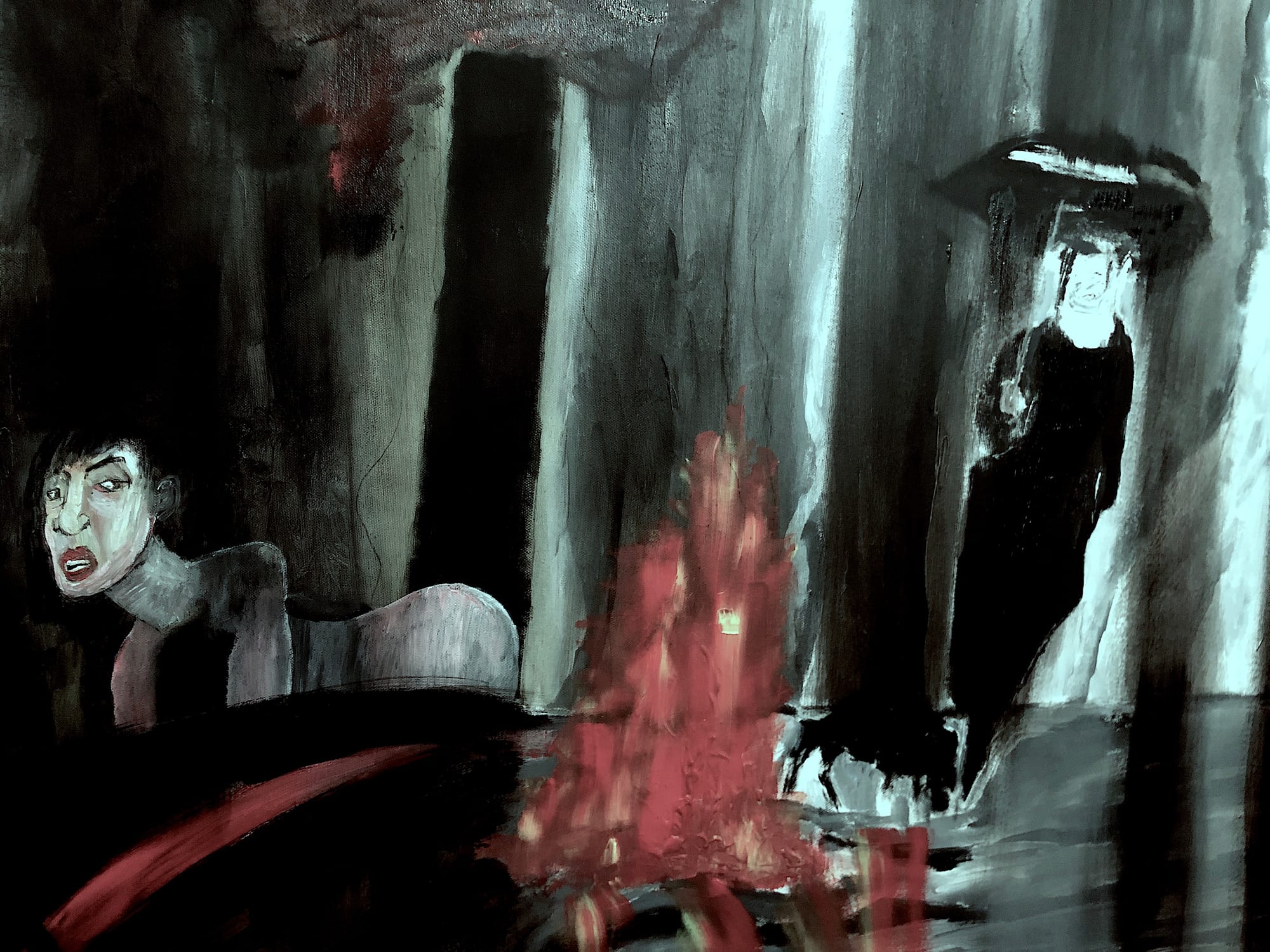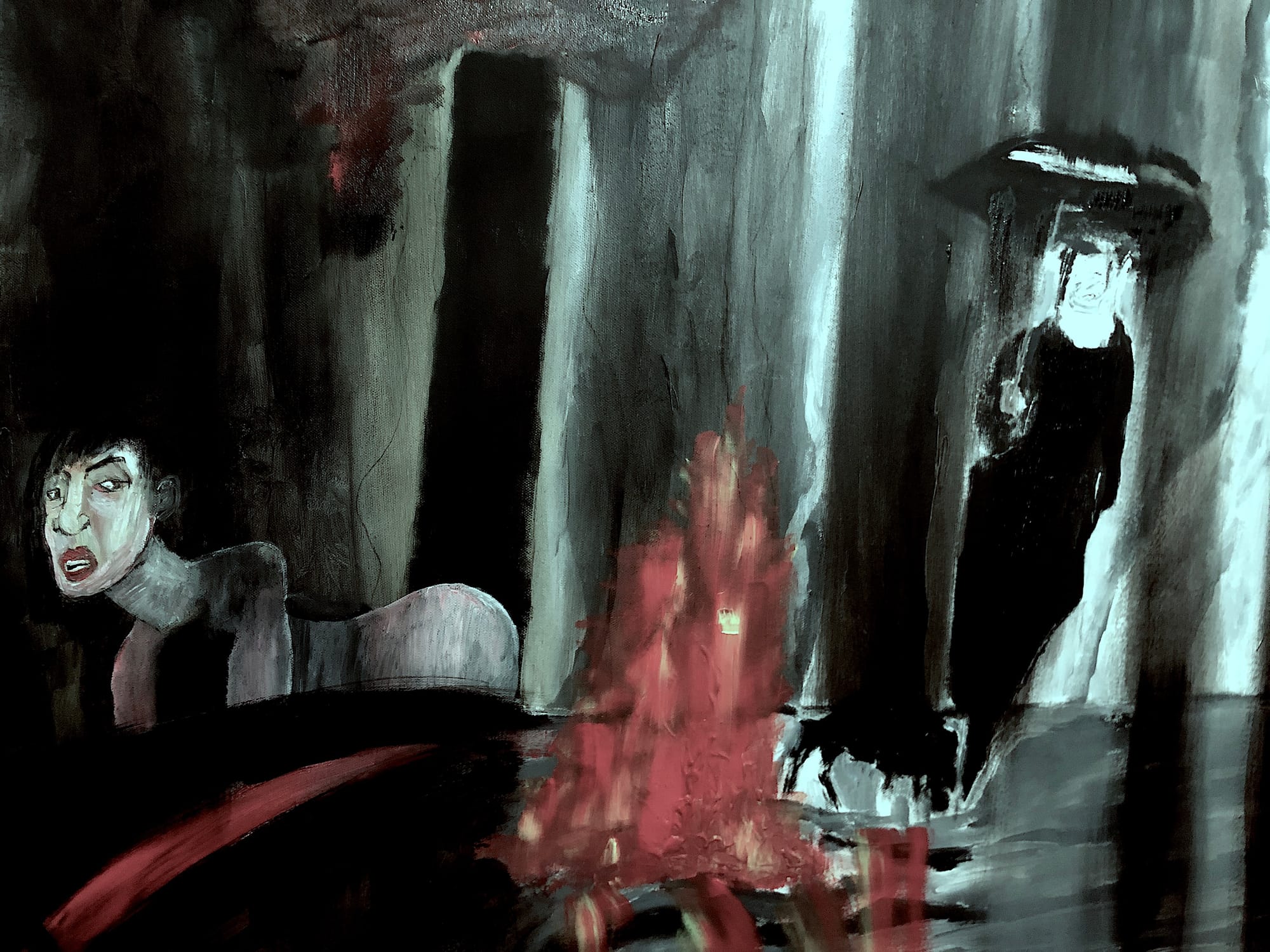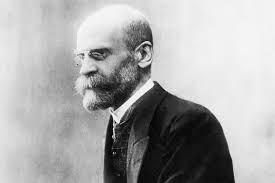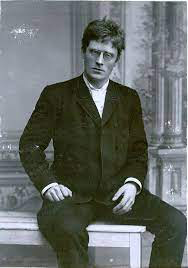Pandemic Conversations 1: Emile Durkheim and Knut Hamsun

During the pandemic lockdown I've overheard certain conversations. I've recorded some. Here's the first.
Two strangers meet during their lockdown walk. One looks like Emile Durkheim but appallingly grimaced and strained as if by the illness of civilisation. The other looks like a thin Knut Hamsun who has the shabby atmosphere of the deranged prophet. Scurrying along the side roads late at night they stand across from each other, distanced by more than just space and darkness. Rain hisses down. There follows a scuffle of exchanges before they rush away into anonymous night taking different roads, avoiding any late night wanderers, muttering new things but to their own upturned coat collars, returning to ther isolated rooms…

Emile Durkheim: Your look is that of the melancholy suicide. —this is connected with a general state of extreme depression and exaggerated sadness, causing the insanity of no longer realizing the bonds which connect you with people and things about you. Pleasures no longer attract.
Knut Hamsun: An increasing number of people who lead mental lives of great intensity, people who are sensitive by nature, notice the steadily more frequent appearance in them of mental states of great strangeness ... a wordless and irrational feeling of ecstasy; or a breath of psychic pain; a sense of being spoken to from afar, from the sky or the sea; an agonizingly developed sense of hearing which can cause one to wince at the murmuring of unseen atoms; an irrational staring into the heart of some closed kingdom suddenly and briefly revealed.
ED: You know … when this ultimate crisis comes... when there is no way out - that is the very moment when we explode from within and the totally other emerges: the sudden surfacing of a strength, a security of unknown origin, welling up from beyond reason, rational expectation, and hope. Reality seems valueless by comparison with the dreams of fevered imaginations; reality is therefore abandoned.
KH: Yes. I was conscious all the time that I was following mad whims without being able to do anything about it … . Despite my alienation from myself at that moment, and even though I was nothing but a battleground for invisible forces, I was aware of every detail of what was going on around me.
ED: Recall this: the most barbarous and the most fantastic rites and the strangest myths translate some human need, some aspect of life, either individual or social.
KH: Ha. I can't even make up a rhyme about an umbrella, let alone death and life and eternal peace.
ED: Listen friend. One cannot long remain so absorbed in contemplation of emptiness without being increasingly attracted to it. In vain one bestows on it the name of infinity; this does not change its nature. When one feels such pleasure in non-existence, one’s inclination can be completely satisfied only by completely ceasing to exist.
KH: Ay, but now the world breaks in on us, the world is shocked, the world looks upon our idyll as madness. The world maintains that no rational man or woman would have chosen this way of life - therefore, it is madness. Alone I confront them and tell them that nothing could be saner or truer! What do people really know about life? We fall in line, follow the pattern established by our mentors. Everything is based on assumptions; even time, space, motion, matter are nothing but supposition. The world has no new knowledge to impart; it merely accepts what is there.
ED: It is true that we take it as evident that social life depends upon its material foundation and bears its mark, just as the mental life of an individual depends upon his nervous system and in fact his whole organism. But collective consciousness is something more than a mere epiphenomenon of its morphological basis, just as individual consciousness is something more than a simple efflorescence of the nervous system. It is society which, fashioning us in its image, fills us with religious, political and moral beliefs that control our actions. Hence we are the victims of an illusion which leads us to believe we have ourselves produced what has been imposed upon us externally.
KH: No worse fate can befall a young man or woman than becoming prematurely entrenched in prudence and negation.
ED: When there is no other aim but to outstrip constantly the point arrived at, how painful to be thrown back!...Since imagination is hungry for novelty, and ungoverned, it gropes at the random. That’s you.
KH: So? Rather than admire the mediocre great men over whom passersbys nudge each other in awe, I venerate the young, unknown geniuses who die in their teens, their souls shattered - delicate, phosphorescent glowworms that one must see to know they really did exist.
ED: That’s just a symptom. As all the other beliefs and practices assume less and less religious a character, the individual becomes the object of a sort of religion. We carry on the worship of the dignity of the human person, which, like all strong acts of worship, has already acquired its superstitions.
KH: But has anything happened to you? Your face is so strangely distorted.
ED: I suffer. We do not make the guilty party suffer for the sake of suffering; it is nonetheless true that we find it right that he should suffer. Reality seems valueless by comparison with the dreams of fevered imaginations; reality is therefore abandoned. Just as reflection disappears to the extent that thought and action take the form of automatic habits, it awakes only when accepted habits become disorganized.
KH: Well, bless my soul, what stupid creatures one has to mix with in this world! Never stand around saying 'Poor thing' and being pitiful when things are being killed. It makes them tough and harder to kill. Remember that!
ED: Likewise, we should not say that an act offends the common consciousness because it is criminal, but that it is criminal because it offends the common consciousness.
KH: What if one were up there, drifting about among suns and feeling the tails of comets fan one's forehead! How small the earth was and how puny the people; a petty place of provincial souls and a mortgage bank to help feed them! What was life worth at such a rate? You elbowed yourself ahead in the sweat of your face for a few mortal years, only to perish all the same, all the same!
ED: It’s inevitable. Anyone who has truly practiced a religion knows very well that it is the set of regularly repeated actions that make up the cult, that stimulates the feelings of joy, inner peace, serenity, and enthusiasm that, for the faithful, stand as experimental proof of their beliefs. The cult is not merely a system of signs by which the faith is outwardly expressed; it is the sum total of means by which that faith is created and recreated periodically. Whether the cult consists of physical operations or mental ones, it is always the cult that is efficacious.
KH: Fall has arrived and has already begun to put everything into a deep sleep; flies and other insects have suffered their first setback, and up in the trees and down on the ground you can hear the sounds of struggling life, puttering , ceaselessly rustling, laboring not to perish.
ED: Man cannot become attached to higher aims and submit to a rule if he sees nothing above him to which he belongs. To free him from all social pressure is to abandon him to himself and demoralize him. One does not advance when one walks toward no goal, or - which is the same thing - when his goal is infinity.
KH: A story about a rich man who was curious, too. He shot himself just to find out what comes after death. Ha, ha, ha! That's the height of curiosity, isn't it? Shooting yourself to find out what comes after death!
ED: Life, it is said, is only tolerable when we perceive in it some reason to be, when it has a purpose, and it is worth it. Now, the individual, by itself, is not a sufficient end to his activity. He's very little. In addition to being limited in space, it is closely limited in time. In these conditions, we cannot have the courage to live, that is, to act and fight, since, from all this work we have, nothing will be left. In short, the state of selfishness would be in contradiction with human nature and, therefore, it would be too precarious to have a chance to endure.
KH: As I stoop in this position, letting my eyes wander down my breast and legs, I notice the twitching motion made by my foot at each beat of my pulse. I sit up halfway and look down at my feet, and at this moment I experience a fantastic, alien state I’d never felt before; a delicate, mysterious thrill spreads through my nerves, as though they were flooded by surges of light. When I looked at my shoes, it was as though I had met a good friend or got back a torn-off part of me: a feeling of recognition trembles through all my sense, tears spring to my eyes, and I perceive my shoes as a softly murmuring tune coming toward me. Weakness! I said harshly to myself, and I clenched my fists and said: Weakness. I mocked myself for these ridiculous feelings, made fun of myself quite consciously; I spoke very sternly and reasonably, and I fiercely squeezed my eyes shut to get rid of my tears. Then I begin, as though I’d never seen my shoes before, to study their appearance, their mimicry when I move my feet, their shape and the worn uppers, and I discover that their wrinkles and their white seams give them an expression, lend them a physiognomy. Something of my own nature had entered into these shoes --- they affected me like a breath upon my being, a living, a breathing part of me…
ED: With whatever spontaneity we obey the voice that dictates this self-denial, we feel that it speaks to us in an imperative tone that is not that of instinct. Therefore, even though it is heard within our consciences, we cannot without contradiction look at it as our own. But we alienate it, as we do for our sensations; we project it outwards, we relate it to a being whom we conceive as external and superior to us, since he commands us and we comply with his injunctions.
KH: This is a life you do not understand. Yes, your home is in the city, and you have furnished it with vanities, with pictures and books; but you have a wife and a servant and a hundred expenses. Asleep or awake you must keep pace with the world and are never at peace. I have peace. You are welcome to your intellectual pastimes and books and art and newspapers; welcome, too, to your bars and your whisky that only makes me ill. Here am I in the forest, quite content. If you ask me intellectual questions and try to trip me up, then I will reply, for example, that God is the origin of all things and that truly men are mere specks and atoms in the universe. You are no wiser than I. But if you should go so far as to ask me what is eternity, then I know quite as much in this matter, too, and reply thus: Eternity is merely unborn time, nothing but unborn time.
ED: Rubbish. Social man...is the masterpiece of existence…
At that they put on their face masks and scurry away like beetles.

